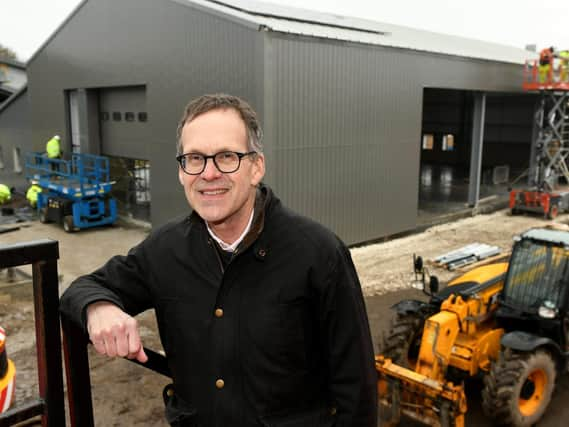Building on skills will be 'crucial' to finding a sustainable future for farming says head of Bishop Burton College


Bill Meredith, Principal of Bishop Burton College, said developing this crucial expertise will become increasingly important not only for new entrants to farming but to retrain and update the existing farm workforce.
With agri-tech, one of the key drivers to competing on the new national and global stage, the college, which is based in Beverley, East Yorkshire, is currently in the middle of a capital project, which has seen an investment of almost £2m in precision farming.
Advertisement
Hide AdAdvertisement
Hide AdWhen it is completed in late spring, the new building will form the hub of a complete precision farming system, which will play an important role in the college’s agricultural courses.
“Farming effectively with fewer inputs and improving the capacity for carbon capture means a change in practice,” Mr Meredith said.
“On our college farm we are making changes, including switching to direct drilling and we will be engaging with farmers to help make fundamental decisions for our future courses.”
The use of precision technology will potentially have a key part to play in helping farmers meet the requirements of the incoming Environment Land Management scheme (ELMS).
Advertisement
Hide AdAdvertisement
Hide AdBrought in by the new Agriculture Bill, which became law in November last year, ELMS puts the environment front and centre of the new subsidy system, which will see farmers paid ‘public money for public goods’ such as carbon capture, air and water quality, wildlife habitats and animal welfare.
Mr Meredith said this change may lead to some farmers leaving the sector but, he said, it could open up new opportunities for younger farmers wanting to embrace the change.
The college, which has on-site farmland covering around 360 hectares, has been looking at more environmental ways of farming for a number of years.
“The college farm has always been used as a green lab and also as a demonstration farm for people across the wider region,” Mr Meredith explained.
Advertisement
Hide AdAdvertisement
Hide Ad“We do feel we are leading the way on this and post Brexit we knew any plans Defra would be putting in place would link into environmental objectives.”
The farm’s enterprises include arable crops and livestock including pigs, sheep and beef cattle.
“As a mixed farm site we do feel we can demonstrate best practice,” Mr Meredith said.
“The college farm has super natural resources including parkland, woodland and hedge-rows.”
Advertisement
Hide AdAdvertisement
Hide AdClimate change is recognised as one of the biggest global challenges and nationally agriculture has set itself ambitious targets for becoming carbon neutral.
In 2019 the NFU set out its aim for agriculture in England and Wales to achieve net zero in 2040, a decade before the Government’s 2050 deadline.
The goal for Bishop Burton’s farm manager Andrew Charlton is to take the college farms to net zero by 2030, a decade before the national agricultural goal.
But, Mr Meredith said, to build a sustainable future, it was important for the industry to understand business and encourage an entrepreneurial mindset.
Advertisement
Hide AdAdvertisement
Hide AdSince the first lockdown in March last year, which saw farmers listed as key workers, farm shops and food producers have adapted their businesses to meet demand whether that is building online platforms, adapting outlets into drive-thrus or offering home delivery.
Added to that, following the debate over food standards, there is also a much higher level of awareness around food safety and provenance.
“People value local food and knowing what they are eating,” Mr Meredith said.
“Adding value to food production will help sustainability and we are keen for our students to get those business and entrepreneurial skills.”
Advertisement
Hide AdAdvertisement
Hide AdThe pandemic has also brought its own set of challenges to the college, which like other educational establishments has had to find a way to deliver teaching while keeping students and staff safe.
The recent return from the Christmas holidays saw students arrive back on campus, only to leave again days later when the new lockdown was implemented.
“It has been a challenge, but staff have been enormously resourceful,” Mr Meredith said.
“We have largely switched to remote learning and everyone has been very creative.”
Advertisement
Hide AdAdvertisement
Hide AdWhere students don’t have the necessary equipment, the college continues to assist with the loan of laptops and other hardware.
With the college specialising in land-based courses, there is also the issue of delivering the practical side of their education.
“Students will miss out if we are not flexible and we have front loaded our practical teaching as much as possible,” Mr Meredith explained.
“Some students do still come in for some of the practical elements such as assessments but we do also use video which means students can get a feeling for the practical side.
Advertisement
Hide AdAdvertisement
Hide Ad“It is not a replacement and we do hope we can get back to the practical teaching in the summer.”
The college, which now has its own testing station on campus to enable students and staff to be regularly tested for the virus, carried out a survey during the first lockdown when virtual teaching was introduced.
Mr Meredith said the results had been extremely positive.
“Students seem to have enjoyed the experience and in the main had risen to the challenge of working from home,” he said.
Comment Guidelines
National World encourages reader discussion on our stories. User feedback, insights and back-and-forth exchanges add a rich layer of context to reporting. Please review our Community Guidelines before commenting.